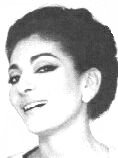VAI recently issued a never-before-available concert that Callas sang at the Shrine Auditorium in Los Angeles on November 29, 1958. Nicola Rescigno conducted. Note the year; it is late Callas, when her work could either be fantastic or it would curdle milk, but any undiscovered Callas is better than no Callas at all. For this concert, I am happy to say, she was in good voice.

The concert was part of a 10-city tour that Sol Hurok arranged between October 1958 and January 1959, and it was her first American concert tour. She was still with Meneghini at the time, but 1959 was the year she chucked him out the door. The concert was always the same, consisting of six arias that were very demanding vocally, but brilliant choices in that their diversity showed off Callas’ exceptional gifts as an artist, and in this case, a mature artist who knew exactly what she was about. (Clicking the picture plays a RealAudio clip--if you can't hear it, download the RealAudio plugin here.)
The tour was interrupted a couple of times. Callas went to Dallas to sing La Traviata in October, and appeared in Medea the day after Bing had fired her from the Met. In December, she went to Paris to sing in a gala evening at the Opera that was televised, and it is available on video (it contains Act II of Tosca with Gobbi). Hurok later remarked that it was necessary to put up with these interruptions or there would have been no concert tour whatsoever.
"Tu che invoco" from Spontini’s La Vestale was a good choice to open with. It lies in the middle of the voice initially, allowing Callas to ease into things slowly at first, without too much strain, but ends with very dramatic outbursts, culminating in a big high C.
"Vieni, t’affretta" from Verdi’s Macbeth follows (without the cabaletta but with the reading of the letter), an aria that she had just recorded.
"Una voce poco fa" from Rossini’s Il Barbiere di Siviglia is next and it is quite a dramatic and vocal contrast to the Macbeth aria that preceded it, allowing us to witness Callas’ uncanny ability to showcase arias of opposing uniqueness, on one hand dramatic and dark, on the other light and playful. Few singers I know of could bring this off so successfully.
There follows "L’altra notte" from Boito’s Mefistofele. Suffice me say that even Callas has difficulty making this trite music sound good.
"Quando m’en vo" follows the Rossini, a curious repertoire choice to be sure, as this was an aria that Callas never recorded commercially, nor did she ever sing the role. It is the least effective number on the disk, because Callas sings it rather pedantically and tries to make a dramatic statement with it, rather than enjoying it as the coyingly playful piece it really is. The concluding high B she belts out is overkill.
And "A vos jeux" the 10 minute Mad Scene from Thomas’ HAMLET closes the concert.
Firstly, the sound is somewhat disappointing. Both Callas and the orchestra sound distant, giving one the impression that is was recorded in the bottom of Grand Central Station. Maybe the Shrine Auditorium is a plausible substitute. It is difficult to hear the reading of the letter. Strangely, several of the arias have pitch problems, "Tu che invoco" and "Vieni, t’affretta" for instance are a bit sharp. The applause either is cut off or ends abruptly, which is a pity.
Secondly, Callas in 1958 could often be thrilling, both vocally and dramatically, secure, and inspired, but by this time signs of vocal wear and tear were beginning to manifest themselves. There is a noticeable drop in volume in her middle register at times, and the top notes are almost screamed rather then sung, as if she is proving that she can still belt them out. Certain things are approached carefully now, and lack her vocal abandon of previous years. The usual vocal problems associated with her -- occasional sharpness, squally notes, raw bottom notes, and an occasional wobble -- are all there to be enjoyed or ridiculed, but so are ravishing pianissimos, large doses of portamenti, and great trills, as well as her inspired dramatic insights that few can emulate.
All in all, in spite of lackluster sound and a singer who is just about at the end of her prime period, this disk is a most welcome souvenir of Callas at her almost-best. P13
| TOP of PAGE |
| Website Design by: |